A few years ago, the riots in Jerusalem over Israel’s planned eviction of Palestinians from their homes to accommodate Jewish settlers would have been covered as an obstacle toward a resolution of the conflict. Not anymore. Instead, it is now being framed as part of the Palestinian struggle against apartheid.
Israel’s possible relationship to apartheid is moving from the fringe and polemical to the center and analytic. Not too long ago anyone who dared to kick this hornet’s nest could expect, not a reasoned conversation, but ridicule and accusations of anti-Semitism. But increasingly this question is becoming seriously debated and voices in the affirmative—those who believe Israel is inching towards being an apartheid state (or already is one)—are growing and sounding stronger and more persuasive.
Several factors have made it more permissible to discuss the possible connection between Israel and apartheid. The first is that the occupation has ceased to be temporary and has become a permanent state-of-affairs. It has been over a half century since Israel captured Jerusalem, the West Bank, and Gaza, and international humanitarian law governing occupation was never built for never-ending situations.
Relatedly, there are no negotiations, and the two-state vision has turned into a one-state reality. Oslo is approaching its 30th anniversary, and the last serious negotiations occurred at the turn of the century. The Trump peace plan all but gave Israel the green light to legalize is rule. There are few who imagine that peace talks are anywhere on the horizon, and current conversations center on improving the living conditions and defending the basic human rights of Palestinians—not on creating a new state.
The combination of permanent occupation and the death of Oslo leads to the inevitable conclusion that the land between the river and the sea are one state. Some will continue to hide behind the fiction that Israel’s sovereignty stops at the Green Line and Jerusalem. But if we accept that sovereignty is based not only on law but also on effective control, then Israel has become the Greater Israel of the dreams of many right-wing Zionists and religious nationalists. In this view, Israel’s repeated threat to annex part of the territories deserves a response commensurate with a shrug than a full-blown crisis; if anything, Israel has more latitude with “occupation” than with “annexation.”
This situation has also led to murmurs of a shift in strategy among Palestinians living under occupation. They continue to call for national self-determination and a Palestinian state, but many are becoming more pragmatic and raising the possibility of becoming citizens of Israel. If you can’t beat `em, join `em.
These developments have shifted the Israeli-Palestinian conflict from being an international issue—attempting to establish borders between two different nations—to a domestic issue: attempting to manage majority-minority relations within Israel. But the majority is no longer defined by demographics. Before 1967, Israel was about 80 percent Jewish and 20 percent Arab, and this breakdown continues today in Israel proper. But once the demographic count expands from current citizens to all who reside under Israeli control, there is a near split between the Jewish and non-Jewish populations. If the majority status of Israeli Jews is no longer defined by demographic size, then what? Israel’s laws, politics, economy, and culture privileges Israeli Jews and defines Israel as a Jewish state.
Why anyone is surprised that Israel has inched toward apartheid is a little surprising. Israel was established as a state for the Jews. Israel’s commitment to liberal principles was always more precarious than many in and outside of Israel wanted to accept. Israeli Arabs had civil and political rights, but economic and cultural rights, and even their movement until 1965, were highly circumscribed. The inferior status of Israeli Arabs has been reinforced over the years, most recently by Israel’s “nation-state law.” This law defines Israel as “the nation-state of the Jewish People” and holds that “the exercise of the right to national self-determination in the State of Israel is unique to the Jewish People.” The law makes no mention of democracy or equality for others. If it did, then it would potentially undermine the very purpose of the law: to keep Israel Jewish.
The inequality between Jews and non-Jews is amplified in the territories, where there are two sets of laws—one for Israeli Jews and one for Palestinians. In general, non-Jewish residents now form a caste as described by Isabel Wilkerson in her book that uses this concept to explore African American life in the United States.
Apartheid began as a system of rule established in South Africa designed to enshrine white supremacy and the permanent subordination of Black South Africans. It has now become a crime against humanity in international law. Consequently, classifying Israel as an apartheid state not only situates Israel alongside one of the most contemptible and hated regimes of the 20th century, but also possibly holds severe legal and political consequences for Israel. Some who wield the charge of apartheid want to demonize and delegitimize Israel. But even Israeli human rights groups such as B’tselem and Yesh Din reluctantly arrived at similar conclusions. A February 2021 survey of scholars of the Middle East found that 59 percent described Israel/Palestine as a “one-state reality with inequality akin to Apartheid.”
Many who reject the charge that Israel is an apartheid state cite historical differences between the South African case and Israel and whether race is the principle of discrimination. No two cases are ever totally identical, but are there valid comparisons on the basis of fundamental attributes? Defenders of Israel insist that Israel does not practice racial discrimination, which they claim is the fundamental basis of any legal charge of apartheid. If apartheid does not feel authentic to the Israeli experience, then perhaps Kahanism might be more appropriate.
Even so, there are international legal interpretations that expand race to include other forms of discrimination, including ethnic and religious. And even if these defenders try to use race as a loophole, there remains the claim that Israel is systematically discriminating against a people on the basis of ethnicity, nationality, and religion—which places Israel uncomfortably close to apartheid and other crimes against humanity. This was the basis of the Human Rights Watch’s recent legal conclusion. And it is a claim that many increasingly accept.
A growing consensus that Israel is practicing apartheid could have enormous consequences for Israel. There is the threat that it could be indicted by the International Criminal Court, the International Court of Justice, and other legal bodies. It could fuel the growing campaign to boycott, divest, and sanction Israel. The bipartisan consensus in US politics is slowly eroding, and this could hasten that demise and increase campaigns to suspend military and other forms of aid to Israel. And it could mean that American officials will be under considerable pressure to stop trying to revive a dead peace process and start applying human rights principles to Israel’s rule over the Palestinians. An Israel that always worries about its legitimacy will have even more reason to do so.






